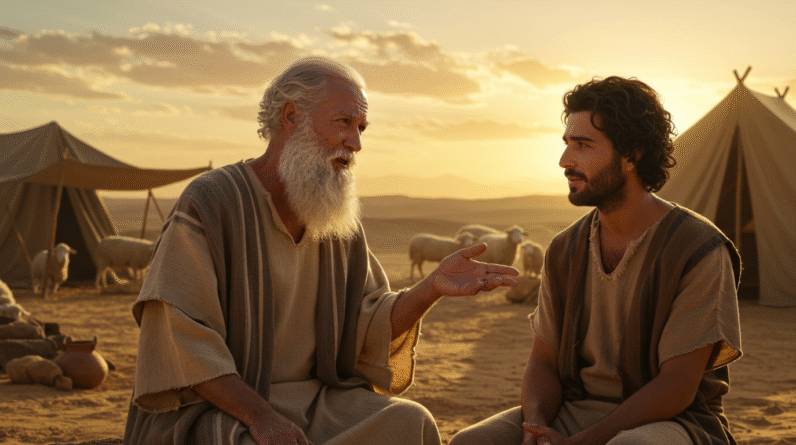Explore the tragic tale of Jephthah’s daughter—a story of vows, sacrifice, and dignity. Reflect on life’s choices and the enduring weight of our words.

Understanding Jephthah’s Daughter: A Tragic Vow and Its Lessons
In the labyrinth of stories tucked away in the ancient texts of the Bible, the tale of Jephthah’s daughter emerges as one of the most heart-wrenching narratives, where human ambition and divine interactions intersect in a somber dance. She is the unnamed daughter of Jephthah, a formidable warrior and a judge of Israel, whose tragic fate ignites questions of faith, promise, and destiny. By delving into her story, we are not only exposed to the cultural and historical nuances of the time but are also prompted to reflect on the perennial themes of promises, sacrifices, and the unforeseen consequences of human actions.
Jephthah’s Daughter in the Bible
Her story begins in the Book of Judges, within a period characterized by tumult and cyclical sin among the Israelites. Judges 11 recounts how Jephthah, despite his origins as the son of a harlot and his consequent estrangement by his family, rose to leadership during a dire time for Israel. He was anointed by the elders of Gilead to fight against the Ammonites, promising him leadership if victorious. This is where the tale takes a turn; Jephthah makes a fateful vow to God, promising that if granted victory over his enemies, he would offer as a burnt offering whatever came out of the doors of his house to greet him upon his return (Judges 11:30-31).
The tragic climax unfolds when, after his triumph, it is his daughter—the one who jubilantly dances out to meet him—that emerges from the doors of his house. In disbelief and sorrow, Jephthah realizes the gravity of his rash vow. His daughter’s story ends with her accepting her fate with dignity, after spending two months in the mountains mourning her virginity with her companions. This act of surrender and acceptance reflects her silent strength and unwritten courage in facing an unchangeable circumstance (Judges 11:34-39).
Lessons from Her Life
Jephthah’s daughter silently teaches us profound lessons shrouded in the depths of her tragedy. First, the power and sanctity of our words. Jephthah’s impulsiveness in making a vow highlights the seriousness with which commitments should be approached. Words, particularly promises, carry weight, and their ramifications can ripple across one’s life and those around them.
Secondly, her story exemplifies the theme of sacrifice and the paradox of loyalty. Even in her youth, her willingness to abide by her father’s vow conveys a sense of duty and submission, not out of weakness, but out of profound respect for a commitment made to God, however misplaced it was.
Lastly, there’s an essential lesson about acceptance and resilience. Jephthah’s daughter spends her final days mourning her unfulfilled life, yet she embodies a dignified acceptance of her fate. Her response is an archetype of resilience, inviting us to ponder our responses to the uncontrollable and often painful aspects of our lives.
Connection to Today’s World
In a world susceptible to impulsivity and hasty decisions, Jephthah’s daughter’s story resonates loudly. Whether it is promises made in the heat of the moment or commitments that bind individuals across various aspects of life, the narrative implores one to consider the effects their actions can have on themselves and those around them. Her story is particularly poignant in reminding us of the weight of our words and the importance of thoughtfulness before making promises we cannot foresee fulfilling.
Moreover, her quiet strength offers solace to those grappling with personal sacrifices and unanticipated life circumstances. At a time when countless people face the uncertainties of life, her narrative shines a light on resilience and acceptance, virtues that hold just as much value now as they did then.
Key Bible Verse
A key verse that encapsulates the essence of her story is found in Judges 11:39: “After the two months, she returned to her father, and he did to her as he had vowed. And she was a virgin.” This verse stands as a stark reminder of the weight of vows and promises, emphasizing the finality of Jephthah’s decision and the valor of his daughter in fulfilling a commitment over which she had no control.
Thought-Provoking Question
After reading about Jephthah’s daughter, ask yourself: In moments of haste, do I consider the long-term impacts of my choices and words on those I love? Are my actions driven by true understanding and foresight?
Historical/Cultural Context
During Jephthah’s era, vows made to God were seen as binding and irrevocable, reflecting the weight of one’s word at the time. Such promises were integral to the cultural and religious landscape, with their breaching considered severe. This context amplifies the tragedy of Jephthah’s daughter, who becomes an embodiment of the clash between cultural expectations and individual sacrifice, demonstrating the severe repercussions of rash vows in ancient society.
Comparisons with Other Biblical Figures
Jephthah’s daughter’s story is often reflected against that of Isaac, who was also poised as a sacrifice by his father, Abraham. However, unlike Jephthah’s daughter, Isaac was spared by divine intervention (Genesis 22:9-12). This contrast underscores the brutality and finality of human error absent divine reprieve, and the poignancy of her fate, which did not afford her the same deliverance.
Prayer
Heavenly Father, give us the wisdom to weigh our words carefully and the strength to face life’s challenges with grace and dignity. When we are caught in life’s complexities, may we reflect on Jephthah’s daughter’s story to inspire resilience and acceptance. Amen.







